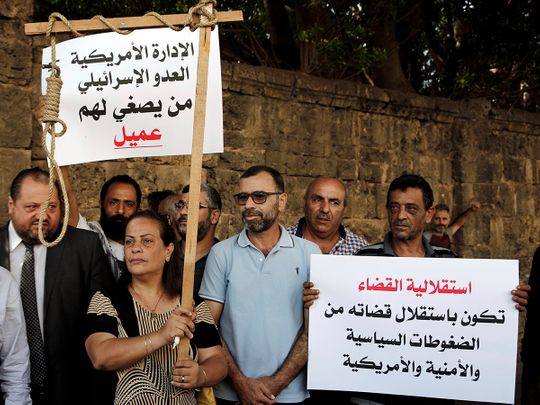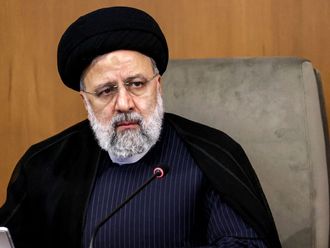
Beirut - A Lebanese-American man was referred Friday to prosecutors after confessing he'd worked for Israel during its occupation of Lebanon for nearly two decades, a Lebanese security agency said.
Amer Fakhoury was detained after returning to his native Lebanon from the United States earlier this month. He had worked as a senior warden at the Khiam Prison in southern Lebanon that was run by an Israeli-backed militia, known as the South Lebanon Army, until Israel ended an 18-year occupation of the area in 2000.
Lebanon and Israel have been officially at war since Israel's creation in 1948.
Fakhoury return to the country sparked widespread condemnation and revived accusations of torture.
The country's General Security agency has been interrogating Fakhoury since Wednesday, the source added.
Another security source said the former SLA member had fled to the United States and had already been charged in absentia to 15 years in prison for collaborating with Israel.
Human rights groups have said in the past that Khiam prison was a site of torture and detention without trial before it was abandoned in 2000. Israel denies the allegations.
Former inmates accuse Fakhoury of ordering the torture of thousands of detainees held there before Israeli forces withdrew from the area in 2000, ending their 22-year occupation of south Lebanon.
The former inmates joined nearly a hundred demonstrators on Thursday outside the Ministry of Justice in Beirut, where they condemned Fakhoury's return to Lebanon, calling him a "butcher."
"Not a single person held in Khiyam was spared physical and psychological torture," said Abbas Kabalan, who was detained there from 1987 to 1988.
"Fakhoury used to issue direct orders for the torture of inmates," Kabalan added, accusing him of also taking part in beatings.
Hilal Salman, another former inmate, blames Fakhoury for his brother's death.
"My father and mother and brother were all held in Khiyam," he told AFP at the protest.
"My brother was killed there in 1989 because of a gas bomb thrown at inmates on the orders of two prison heads, including Amer al-Fakhoury."
It was not immediately clear when Fakhoury entered the country, but the Lebanese Al-Akhbar daily said Thursday that he arrived in Beirut's airport "days ago".
"We reject facilitating the return of agents to the nation," former detainee Anwar Yaseen was quoted saying by state-run National News Agency.
The Lebanese General Security Directorate said Friday that Fakhoury used an Israeli passport before Israel's withdrawal to travel from Israel to the U.S.
“First of all we want the military court to deliver the death sentence by hanging for Amer Fakhoury and all those like him, whether they are inside Lebanon or outside, who are trying to erase their history and to return to Lebanon,” said Firyal Hammoud, former inmate of Khiam prison. “We do not accept less than a public death sentence.”
"Will not forgive"
Hundreds of former Lebanese members of the militia had fled to Israel, fearing reprisals if they remained in Lebanon. Others stayed and faced trial, receiving lenient sentences.
Thousands of former SLA members have been tried in Lebanese military court for collaboration, and the powerful Shiite Hezbollah movement has complained that sentences given to those convicted have been too light.
Many of the Khiyam personnel escaped to Europe or North America when Israel withdrew its forces from south Lebanon in 2000.
Finance Minister Ali Hassan Khalil, an ally of the militant Hezbollah group, tweeted Friday that the Lebanese people "will not forgive" those who pained them.
Khalil said there are attempts to clear the names of "60 agents for Israel" and "we should take this very seriously" and follow the case.
Also on Friday, the Lebanese Foreign Ministry summoned Ethiopia's charge d'affaires demanding information about Lebanese businessman Hassan Jaber, whom the ministry said was detained in Addis Ababa on Saturday.
The ministry informed the Ethiopian diplomat that Beirut wants "clear answers" by Monday, otherwise Lebanon would take countermeasures.
Some Lebanese media outlets have speculated that Israel or the United States might have been behind Jaber's arrest.
In 2017, Lebanese businessman Kassim Tajeddine, was arrested in the Moroccan city of Casablanca while on his way from Guinea to Beirut. He later surfaced in the United States, where he was charged with laundering money for Hezbollah.










